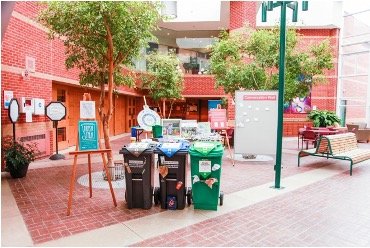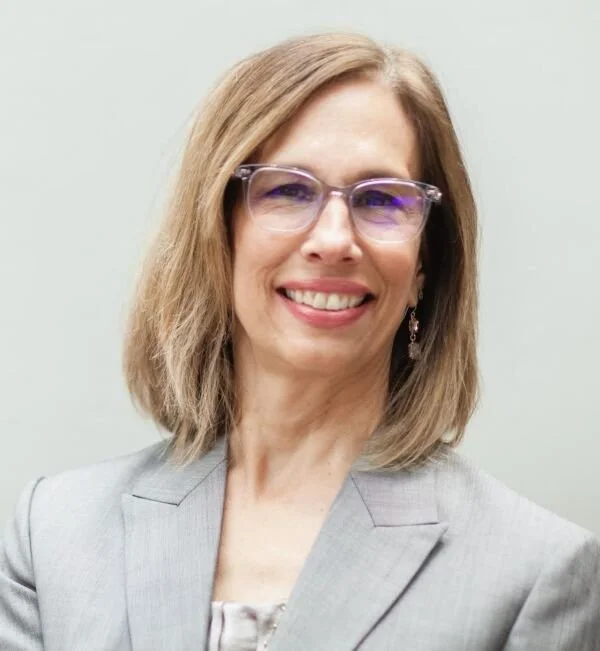Leadership, Communication & Experiential Learning at the Forefront of Peel SB Sustainability
Sustainability in education requires a myriad of skill sets today: leadership, innovative and engaging communications, and experiential learning, as noted by staff at Peel District School Board (PDSB). In a recent interview with PDSB, Shahid Naeem, Manager, Energy and Sustainability, notes how important leadership messaging and modelling are to engage students and staff at PDSB.
Photo Credit: Rashmi Swarup @PDSBDirector, Twitter Feed
“The promotion of environmental sustainability within PDSB is a constant, year-round commitment, led by our Director of Education, Rashmi Swarup. Beginning from our annual start-of-the-school-year event, and continuing through regular presentations and social media updates, Rashmi’s commitment to championing sustainability is not only evident, but it is also highly effective. Her messaging reaches a wide audience, enabling us to foster a culture of sustainability throughout our organization,” notes Shahid.
“Leadership is crucial for implementing change within an organization, particularly in our school board where we are responsible for the education of 155,000 students and oversee a workforce of 16,000+ employees.” This work is well complemented by Tracy Appleton, Sustainability, EcoSchools; her EcoSchools Twitter account alone has 5,000 followers. This is an excellent way to get the message out and to get engagement across the system. Embarking on a number of communication efforts targeted to students, staff and parents, Tracy and Shahid deploy visuals and dashboards to engage, educate, inspire action, and create a culture of sustainability.
“As a school board, we are not just about cost efficiencies, but our goal is to try to create a culture of sustainability,” says Shahid. “For example, Tracy is doing a ‘trash talk’ display right now in our main Board office building for everyone in our community to see and learn from.”
The Office of Energy and Sustainability offers educational and behavioural programs and student-centered commissioning. With electronic displays in every single building, students and staff can view real-time energy and solar-power production. The Board has 21 megawatts of solar arrays on school rooftops, one of the largest solar power projects in Ontario.
Shahid Naeem, Manager, Energy and Sustainability, Peel District School Board
“We share the solar production, water usage and other aspects of the buildings in real-time, on our electronic displays, encouraging our students to use the technology themselves in a way that an energy manager would create experiential learning opportunities,” says Shahid.
Students have access to Energy Building Information Systems and experience them fully. In addition, there are teacher training workshops in Solar 101.
In 2022, the Peel board embarked on a transformative initiative, that attempted to address the strong educational demand for environmental education, and implemented a green learning program. A total of 2,283 students from a diverse representation of 47 different schools enthusiastically embraced the opportunity to participate. In tandem, 69 dedicated teachers also participated. The experiential learning focused workshops were a mix of live and pre-recorded online formats, enabling us to cater to a variety of staff and students.
“We learn within our experiences – students learn best when it’s within their zone of proximal experience, and we offer scaffolded learning while guiding them through the process of learning while doing. Every discipline has its own way of including this lens and we provide guidelines for sustainable education, but it’s still a work in progress,” explains Shahid.
Tracy Appleton, Sustainability Specialist/EcoSchools Lead/PESC Chair, Peel District School Board
Another experiential and behavioural program the Board has been involved with is EcoSchools Canada. “I’ve been involved with the Peel EcoSchools program, an enhanced curriculum partnership with the Region of Peel and Toronto and Region Conservation Authority (TRCA) for 14 years of the 15-year partnership. The key is flexibility,” says Tracy. “You’ve got to have flexibility to allow schools to pick and choose what works and makes sense for them.” Tracy sees Earth Day as a highlight but wants to make sure students and staff go beyond that to promote it as Earth Month. “Actually, Earth Day should be every day,” states Tracy. “The great thing about EcoSchools being a national program is the library of over 50 different actions that schools can take. We recommend that they plan to do a minimum of three. They can participate at a bronze, silver, gold or platinum level. There are lots of customizations, flexibility, curricula, and enhancements. We support our schools through these types of partnerships, as well as incorporating UNESCO keys,” says Tracy.
Lincoln Alexander was one of the top performing s Ontario schools in the Enbridge Sustainable Schools Challenge, for which it received an incentive cheque at the recognition ceremony.
School spotlight: Derry West Village PS, Mississauga.
Twitter @DWVPS – will achieve Platinum level EcoSchool certification again this school year (participating in the program since 2008). CTV (2019) Earth Day feature: https://www.youtube.com/watch?v=YrzLWMQzsSEEcoLead Teachers: Melissa Fay, Twitter @MsMFay, Michael Houghton.
Tracy shared that one of the most popular activities surprisingly enough were the waste audits once they got past the ‘gross factor’: “It really gives them insight into their own behaviour. With our teacher training, i.e., green learning, students are given the opportunity to become their own energy managers in their schools. We put together energy audit kits, as well as water audit meters, and then a whole bunch of different activities and investigations that they can take into their homes, providing the big picture for students on energy and water conservation and waste reduction. It creates more awareness for the resources they’re using every day, and hands-on learning they can take into their own personal lives.
Those are the things that are the most popular, as well as anything to do with gardening and growing things and being outside in nature. A community garden is something that could be accessed through by the whole school community throughout the entire growing season. So, all of the parents, the families are part of that school community – and not just during the school year, but in the summertime and that kind of thing. We have three municipalities that make up our board: Mississauga, Brampton, and Caledon. Almost 100 percent of our schools are involved in community gardens.”
The curriculum, in general, has focused on environmental justice that includes social components. Our procurement processes are no longer just called green procurement, they are now referred to as social procurement. It’s like another layer in the public sector. Students and staff are now seeing the impact of our actions in their own school communities and want to be part of it. They take pride in what they have created, knowing that they have contributed to the greater good. So those are the types of popular things we’re seeing, I wouldn’t say this year, but it’s just kind of, again, a reflection and a wider reflection of where we are as a society.
Since the pandemic this became increasing popular and a wonderful way to give back to those in need in the community. The pandemic raised awareness for the cost of food, and other timely issues that families face every day – the cost of food and the impact if we waste a lot of food. The Town of Caledon has a community garden that the community can access and take what they need. Then, any excess is donated to the food bank, which has been calibrated for other needy families.
Recognizing the significant role that buildings play in contributing to PDSB’s carbon footprint and has implemented an innovative approach to mitigate this. “Our focus is on continuous operational commissioning of our portfolio, and integrating sustainability into our capital planning processes. We’re investing in technologies like LED lighting, AI-powered building automation, variable-speed chillers, and we’re carrying out building retrofits on a larger scale. These are all crucial steps we’re taking to enhance performance and cut carbon emissions in the long term,” Shahid states.
PDSB has 21 megawatts of solar power installed atop 124 schools, one of the significant solar initiatives within the education sector. Shahid reflects, “The prospect of solar power never fails to pique the interest of students and staff”. To promote a holistic understanding of this initiative, Shahid conducts informational sessions in various classes in response to student queries. These sessions are not only focused on successful implementations but also address why certain schools may not have been deemed suitable for solar panel installation. Through this transparent dialogue, students gain insight into the multifaceted considerations and requirements necessary for such projects.
“Interestingly, our students often display a deeper and more intuitive understanding of climate change than many of their elders,” Shahid observes. “It seems they’ve evolved to be more attuned to the urgency of environmental issues.” As evidence of this youthful environmental savvy, Shahid recounts receiving a remarkable letter from a group of fourth-grade students. Unsatisfied with merely learning about sustainability, they’d taken initiative to identify practical ways their school could reduce its environmental impact. Their proposal? A complete overhaul of the school’s lighting system to eliminate wasteful fixtures.
“The barrier to reaching many of these goals is the change process, as it’s tough for many to change within the existing silos and the existing framework,” adds Shahid. The PDSB energy and sustainability team has created a collaborative steering committee that reviews what has been done and what needs to be done in the future, creating a holistic problem-solving approach to sustainability for the board.
An important lesson Tracy has learned in her 14 years in her role is that students are hungry for answers, and they are looking for a real hands-on approach to effect change and make a difference. “That’s always an inspirational and driving factor in the work that we do with the schools at every level, and that’s from kindergarten all the way up to the most senior students at the college level,” concludes Tracy.
“As we chart the course for our future, we are enthusiastically embracing the task of revising our Sustainability Plan for the next five years. This exciting journey involves setting new, ambitious performance targets and updating our board and the organization on the significant progress we have achieved so far.
Simultaneously, we recognize the importance of continuous improvement and are diligently evaluating areas where we can further enhance our sustainability practices. As part of this commitment, we are looking forward to exploring new, innovative technologies that have the potential to revolutionize how we operate. For instance, breakthrough advancements like duct-sealing techniques present us with alternative methods that are not only more energy-efficient but also contribute to substantial carbon reduction. These emerging technologies symbolize a promising future, one where sustainability and efficiency form the core of our operations.
We are looking at these technologies to see what best fits our Board, gives us the performance we need, and meets the demands of our students. Everything we do in sustainability is centered on the needs of our students” concludes Shahid.


















